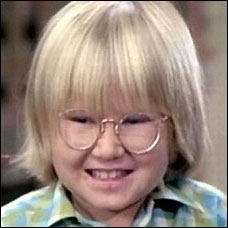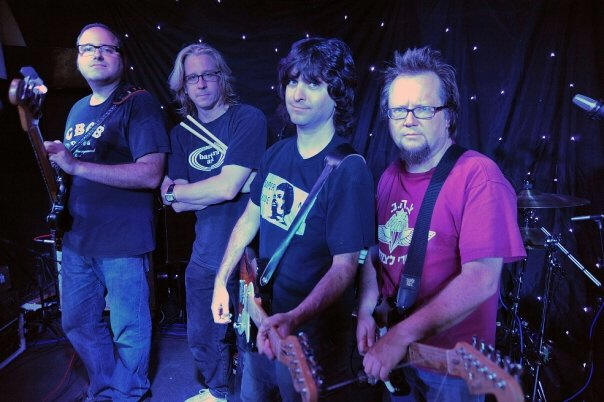“If I met Peter Fonda
tomorrow, a part of me would say, that’s the dude from Easy Rider,”
observes actor/musician/voiceover vet Robbie Rist.
Peter Fonda/Easy
Rider; Cousin Oliver/The Brady Bunch: same difference.
Rist played the
iconic first cousin of the Bunch in the very last six episodes of the
original series, which was first broadcast in 1974. Today, 800 years
later, he is still best remembered for that little guy’s little stint,
despite his ability to actually have a pretty cool, fulfilling, varied
and enriched adult existence.
“It takes on a life
of its own,” Rist says of the Brady phenomenon and the Cousin
Oliver jinx. “It finds its own people. Then those people kind of bring
it back to me. When people meet me, they still see that nine-year-old
head on this forty-five-year-old body, because it’s so fresh in their
memory. And the art itself, which has nothing to do with me, has meaning
to them. I’m basically Haley Joel Osment and they’re all ghosts. They
always wanted to say something to me.”
Here is exactly where
you can see how memory plays tricks: most Brady fans think that Oliver
was part of the series for a lot longer than he was. Yet, for his very
short stay, he is as powerful a pop icon as almost anything that got
hatched in the Seventies. His childhood image – the Dutch Boy haircut,
the wire frames, the John Denver-esqueness of it all – is one of the
most recognizable in the history of television. And that’s pretty
decent.
“I mean, I don’t need
Secret Service or anything,” he says. “But if it’s on the résumé, I
don’t mind talking about it. For a while there, I had a shpilkes
about what I did when I was a kid, and nothing I did as an adult
succeeded on that level. But the other side of it is, I’m still
standing. I’m still in the ring swinging. I wouldn’t be the man I am if
it weren’t for the experiences I’ve had. I’m very pro all of the stuff I
did.”
Today, Rist lives in
the San Fernando Valley (the land of his childhood), and toggles between
music (recording, producing, engineering), acting and voiceover work.
“With all the things
that I do, I can keep the lights on. I do a little voiceover, I do a
little music, I teach a little, I play in bands, I tour every once in a
while. Because I’ve been in entertainment for so long, I sort of end up
in a consulting position.
 “I’ve been playing
music since I started playing violin when I was three, but my hands were
too small. I started piano at five, guitar at eight, bass and drums at
thirteen. At around sixteen I got some recording gear.
“I’ve been playing
music since I started playing violin when I was three, but my hands were
too small. I started piano at five, guitar at eight, bass and drums at
thirteen. At around sixteen I got some recording gear.
“Acting and music,
it’s all art to me. It’s basically the same thing. I can make records
all by myself all day because I play every instrument. I can make
one-man-band records all day, because I was always kind of a loner
anyway. That appealed to me. I can spend all my time in my room making
stuff.
“I liken being an
artist to being an astronaut, in that weightlessness makes you feel like
you are falling all the time. But you have to get used to that or you
can’t do any work. Being an artist is the exact same feeling. You just
go through times where you say, ‘Oh, crap, this sucks! How am I going to
pay my bills?’ Then you make it happen. You trade security for freedom
when you become an artist. As good as it can be, it’s as bad as it can
be.”
He came out of the
womb singing and, well, being unselfconsciously cute. He belied an
intelligence that went beyond the kid-actor thing. And maybe it all
makes sense that pursuing acting was truly his – not his parents’ –
decision.
“When I was a kid, I
was obsessed with the 1930s Universal horror films,” he says. “The
Mummy. Frankenstein. I told my parents, ‘I want to be in a
monster movie,’ which edited down to ‘I want to be in a movie.’ So my
parents say, why don’t we take him on an audition so he’ll see how
boring it is and he won’t want to do it. Well, I got the audition. And
then I got the next one, and the next one…I’m now eight or nine, and my
mom is telling my dad,
‘I’m really bored of driving him around town. I
would like to have a life of my own!’”
Good luck with that,
mom. The Bradys were only part of the quickly crowded resume. There were
also tons of TV commercials, movies, child voiceovers, and, of course,
the Saturday morning kids’ show classic, Big John, Little John.
(He says of that, “If you watch it on YouTube and read the comments,
there are people who write, ‘I thought this was just a fever dream.’”).
He also appeared in
the very last episode of The Mary Tyler Moore Show, which was one
of the most-watched single episodes of any TV show ever. And he was the
voice of one of the Teenage Mutant Ninja Turtles, which,
along with the Bradys, continue to introduce him to newly minted people
as the years go by.
Regarding Turtles,
he says, “The ace in the hole was that I come from the San Fernando
Valley. That’s the birthplace of surf speak. That whole Valley Girl kind
of world came from my neighborhood. Fast Times at Ridgemont High
is like a documentary for me. I went to high school with all of those
people.
“I’m the only one who
has done all three of the [live action Ninja Turtle] movies. I
keep bringing up this word lucky. I’ve been really lucky in that
I keep stumbling into things that never make me huge amounts of cash,
but they definitely keep me in the public awareness. People know who I
am a lot. A lot of them have to do with young people things. There is
always a new generation discovering Turtle.”
Of course, we know
it’s more than just luck. And Rist has a theory.
“I was hired to be
pathetic a lot,” he explains. “Every actor is selling something. Tom
Cruise sells ‘cocky.’ I sold ‘pathetic.’ I was not necessarily a
pathetic person. But I was good at expressing longing even though I was
a very young person.
“I also had the
blonde hair and glasses thing, which was really popular at the time.
And, of course, tremendous amounts of luck. For Oliver, I read against
five hundred kids. So there has to be some ability in there, but I also
think that there was a tremendous amount of luck. That’s how the wheels
spin. For every Quentin Tarentino, there are a whole bunch of guys
making little independent movies. Nobody ever cares about them.”
So what does he
attribute to the level head and the two feet on the ground?
“Good parenting,” he
says. “In every case where a kid actor screws up, it’s the parents.
Don’t blame the kid. Don’t blame Gary Coleman or Todd Bridges or Corey
Feldman. You can’t blame them for where they ended up.
“I’m trying to get a
book off the ground about getting your kid in show business for all the
right reasons. My parents told me in no uncertain terms that what I am
doing is a gift. They said, ‘We’re giving you a gift. We’re allowing you
to put a little money in the bank and exercise your creative jones. If
you act up or screw up in any way, we have no problem killing you and
making another one who looks just like you. ‘
 “Entertainment is
proof of chaos in the universe. Children are also proof of chaos in the
universe. You put those two elements together, and a parents’ jobs
becomes difficult maybe by five times. You have to be ever vigilant. You
have to really know what the hell you are doing, because entertainment
attracts every kind of every person. Some of them are very nice people;
some of them aren’t. And some are just weird. There are managers and all
kinds of people who can really mess with your family. My parents were
threatened with being sued so many times in the time that I was living
with them. They took it on, but I can only imagine the emotional toll it
took on them. So don’t think that just because Junior puts on plays for
the cat that you are going to make money from your kid. If your kid is a
natural born ham, that’s great. Having an artistic outlet is total food
for the soul.
“Entertainment is
proof of chaos in the universe. Children are also proof of chaos in the
universe. You put those two elements together, and a parents’ jobs
becomes difficult maybe by five times. You have to be ever vigilant. You
have to really know what the hell you are doing, because entertainment
attracts every kind of every person. Some of them are very nice people;
some of them aren’t. And some are just weird. There are managers and all
kinds of people who can really mess with your family. My parents were
threatened with being sued so many times in the time that I was living
with them. They took it on, but I can only imagine the emotional toll it
took on them. So don’t think that just because Junior puts on plays for
the cat that you are going to make money from your kid. If your kid is a
natural born ham, that’s great. Having an artistic outlet is total food
for the soul.
“That’s why
entertainment people – those who don’t kill themselves with drugs and
alcohol – tend to live a long time. It’s a constant problem-solving
exercise, but it’s also fun and creative. It keeps your brain working. A
life in art is good, but don’t screw your kid over because of it.”
Yet mom and dad
didn’t throw him to the wolves, not even with the easily sold
misconception that Cousin Oliver single handedly handed The Brady
Bunch its own walking papers. Cousin Oliver, in essence, jumped his
own shark.
He says, “It’s on the
resume, so if people want to talk about how I ruined a show, they can.
There was a website in the ‘90s called whowouldyoukill.com. I believe
the Cousin Oliver character had more emails than anybody else on the
site. A friend of mine took all the quotes from the site and made me a
little booklet. Basically Cousin Oliver is The Knack of The Brady
Bunch.
“Really, the show was
over after Hawaii. It was just a dinosaur that was too stupid to find
its tar pit. The show didn’t go out with a bang. It went out with a
whimper. They just didn’t renew. There was no final episode.”
Indeed, not for
The Brady Bunch, or for Robbie Rist, who continues to get out there
while being universally adored for what had come before.
He says, “Everything
that I have been involved in seems to get a bump of attention lately.
There is a whole Kidd
Video [a short-lived 1984 kids’
show about an intergalactic teen rock band] thing going on now. People are looking at
this stuff.”
Look at Robbie’s stuff by going to
RobbieRist.com
Features Return to the features page